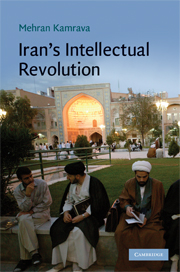Book contents
- Frontmatter
- Contents
- List of tables
- Acknowledgments
- 1 Introduction
- 2 Emerging Iranian discourses
- 3 Theorizing about the world
- 4 The conservative religious discourse
- 5 The reformist religious discourse
- 6 The secular-modernist discourse
- 7 Iran's silent revolution
- Bibliography
- Index
- Cambridge Middle East Studies 29
4 - The conservative religious discourse
Published online by Cambridge University Press: 06 July 2010
- Frontmatter
- Contents
- List of tables
- Acknowledgments
- 1 Introduction
- 2 Emerging Iranian discourses
- 3 Theorizing about the world
- 4 The conservative religious discourse
- 5 The reformist religious discourse
- 6 The secular-modernist discourse
- 7 Iran's silent revolution
- Bibliography
- Index
- Cambridge Middle East Studies 29
Summary
Recent years have seen a proliferation of studies on the ideological and political divides that today mark the Islamic Republican political system in Iran. These ideological divides became especially acute after the emergence of the so-called second republic that followed the end of the war with Iraq in 1988 and the death of Ayatollah Khomeini the following year, when the post-revolutionary system lost some of the institutional and ideological cohesion. There have also been a few works on the appearance of “reformist” political figures within the Islamic Republic, and, more significantly, on Shi'a thinkers whose theories present alternative interpretations of religion's role in the polity – figures such as Abdolkarim Soroush, Mohsen Kadivar, and Mohammad Mojtahed Shabestari. There have, however, been very few treatments of the theoretical dispositions of Iran's more conservative Shi'a ulama and thinkers in the post-Khomeini era, with most of the studies on the subject either being dated by now or, alternatively, concentrating on larger social and cultural issues.
This chapter offers a preliminary examination of some of the main characteristics and major themes in the conservative religious discourse in Iran over the last decade or so. More specifically, the chapter looks at the multiple layers and the changing political contexts within which the conservative religious current articulates its positions and reproduces itself, as well as the characteristics and positions of some main figures involved in the discourse. This requires also an examination of the larger features of the Right's discourse in relation to the Iranian polity, especially as it compares with the “leftist”, “reformist” religious discourse with which it competes.
- Type
- Chapter
- Information
- Iran's Intellectual Revolution , pp. 79 - 119Publisher: Cambridge University PressPrint publication year: 2008



